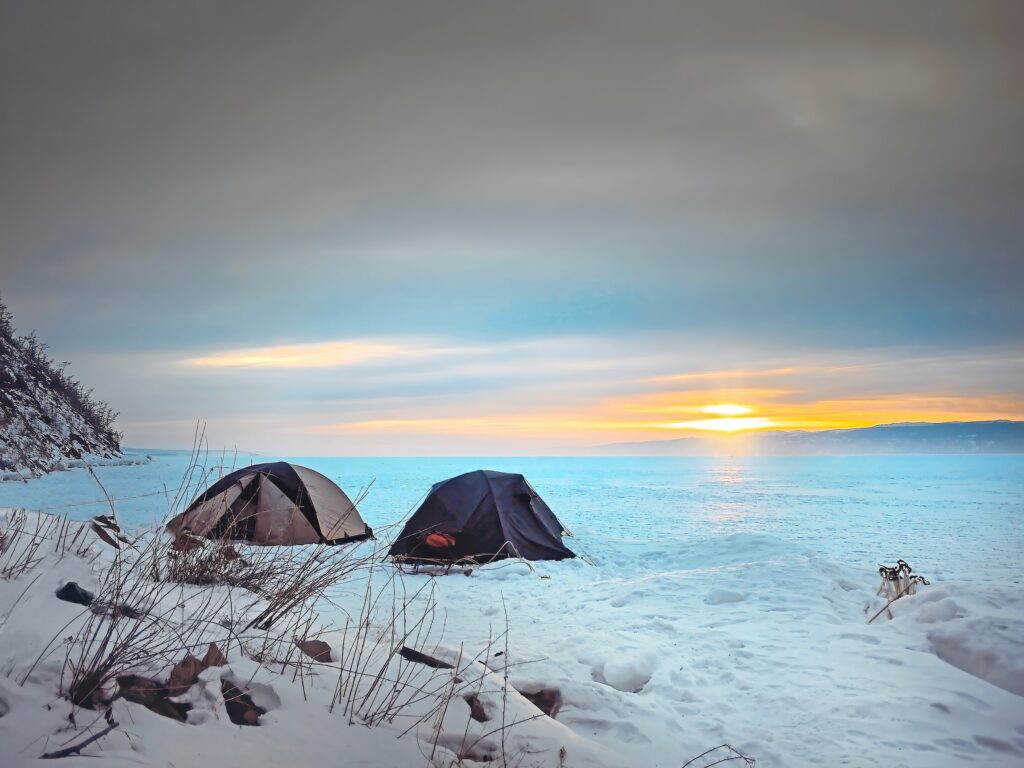Winter Camping and Backpacking Basics

If you have no experience camping or have only camped during warmer seasons, there are things you should consider if you are to set off on a winter camping and backpacking adventure.
Before you even start your camping experience, make sure you familiarize yourself with the weather conditions you’ll be facing and decide on the route you’ll be taking so you don’t risk getting lost.
And now for the essentials.
Table of Contents
Snow Tenting
If you want to camp in the snow, you have 4 options to choose from: a tent, a quinzee, an igloo, or a snow cave. If it’s your first time camping in the snow, a tent would be the simplest choice as it requires less effort.
When choosing a campsite, go for one protected from the wind, away from the avalanche paths, and exposed to the morning sun. The surface doesn’t need to be entirely flat, as you can leave your tent on skis or snowshoes. Just make sure you carry a shovel with you to make a platform for your tent to stand on.
The right tent for your winter camping would be a four-season tent made of fabric for warmth and designed to resist wind and heavy snow. It has more poles, and its walls are steeper, so the snow can fall off it. The downside is that four-season tents tend to weigh more, but they make up for in the comfort they provide.
If you, however, choose to camp using a three-season tent, you’ll have to keep it away from the wind and regularly clean snow off of it. The biggest difference here is that it won’t keep you as warm as the four-season tent. In any case, make sure you stake out the fly properly to allow ventilation.
Sleeping Warm
To stay warm sleeping in a tent in winter, find a sleeping pad providing insulation with an R-value of 4 at a minimum. The sleeping bags you use should be designed for colder weather than you expect (10 degrees lower). If you choose to sleep in a snow shelter, bring a water-resistant overbag, a downbag, or a bivy sack. You can also add mid-layers if you feel extremely cold.
Your head, hands, and feet need special care, so wear a hat and a hood, mittens, and warm socks. You can also make use of a hot water bag or bottle and keep them with you in the sleeping bag.
If you feel the need to pee during the night, you go for it. Holding the urine in makes you cold and awake as your body uses a lot of energy to keep the urine warm.
Staying Safe
Spending days and nights in the wilderness requires precautions when it comes to possible animal encounters. Just in case you are attacked, you want to feel protected. That is why you might consider carrying a light and compact handgun with 40 cal ammo.
Winter Camping Clothes
If you have ever been winter hiking, you know what to wear while winter camping. Just bring more warm clothes to have layers of clothes you can add and change into if you get sweaty or wet.
Make sure you have waterproof boots, warm mitts and gloves, and of course, water bottles and bags you can use to warm up and while sleeping.
Another thing worth mentioning is glare protection. Due to the snow, it can be challenging and quite uncomfortable for your eyes to deal with the bright sun reflected off the snow. That is why goggles or sunglasses can come in handy.
Winter Camping Food Supplies
To prepare food while winter camping, you can rely on canister stoves. They are compact and don’t weigh much, although they do not perform perfectly when it’s very cold. That is why you’ll have to get a liquid fuel or white gas stove.
Choose fatty foods to keep you warmer. Also, make sure the food you bring is easy to prepare and clean up. Have food that is easy to snack on while hiking and doesn’t freeze in your pockets.
If you count on alcohol to warm you up, you can give that idea up. It will only slow your metabolism and cool your body.
You want to stay hydrated, so make sure you drink water regularly. Since normal water bottles tend to freeze and thermoses can be quite hard to carry, you need a bottle that is insulated. Also, boil water when you get up in the morning, and if you run out of water, you can boil clean snow.
Winter Camping Activities
Do something fun to take your mind off the cold temperatures while winter camping and backpacking. You can organize dance parties, play games before bed, tell stories around a campfire, etc.
Keep things interesting to focus on what really matters: spending quality time together in nature.






